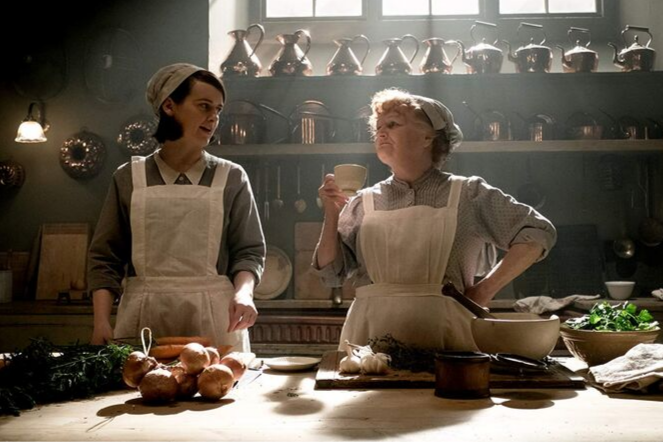Women have always been a big part of Downton Abbey as a series, but in the film, they slay. Both the women of the ruling class and those women downstairs delivered a strong sense of pride to me.
Disclaimer: This article will contain spoilers for Downton Abbey.
As a massive history geek, I have to mention (yes, I am that person at a party) that these women feel very modern. Downton Abbey has always been very nostalgic; for example, the opening scene features a well-dressed man delivering mail. This is not realistic, yet still looks excellent. For many for servants during the 1930s, life wasn’t reflective of Downton Abbey. Instead, it was hard, low-paid and they were often treated poorly.
When watching the film, I found myself enjoying the women in stylish outfits who fired back at each other; it’s a relief to see women represented as three dimensional. The movie passes the Bechdel test, and we must have media that achieves this. The Bechdel test is for visual media and to pass, all that is needed is for two women to have a conversation that is not about a man. Praising Downton Abbey for passing this test feels as though I am giving a gold star to a grown man for putting on a matching pair of socks. Nevertheless, in a world where so many films fail this, it’s nice to have one that passes.

This brings me to the feminist star of the movie, Daisy (I think this should be a new rating system). Daisy began the series as a naïve young woman; she struggled with finding her place in the complex world of the manor. As the assistant to the cook, Mrs Patmore, she is pretty low in the ranking of the house and feels that deeply. Daisy is agreeable to a fault and struggles with finding her voice. This is evidenced in the second season of the television show when Daisy marries William, the second footman who returns from the Great War with life-threatening injuries. Daisy is told numerous times by other characters to marry him despite not loving him. She only agrees because that is what is expected of her.
To contrast, in the film, Daisy refuses to get married to one of the footmen until she feels ready. She is no longer the innocent girl that she was in the television series, she is a woman in charge of her destiny. Whilst viewing this film, I was cheering for Daisy and how much change she has undergone as a character. Her character arc alone is a reason to see the movie.
The brilliant change in Daisy is a result of the lessons she receives from the footman, Mr Mosely. Daisy really shines in her education lessons, and we see her develop a thirst for knowledge. We see this pay off in the movie as Daisy becomes a strong, opinionated woman. We see Daisy leading arguments on why she is against the monarchy, questioning why she is required to do so much additional work for the royals. She finds a use for the excess food ordered by accident and finds a space for it in the cupboard, thus saving Mrs Patmore from receiving a formal warning. In the film, she becomes an educated voice below stairs and shows us the strength of a woman with an education.

The film really shone a spotlight on how things have changed since the beginning of the series. Mary, in particular, began the series as unlikable; she was uncaring of people because of her wealth. She lacked empathy for anyone but herself. By the end of the movie, in contrast, Mary is empathic and caring towards her staff, becoming the heir apparent that Downton needs.
The men in Downton Abbey have never shined like the women, evidenced in Maggie Smith’s portrayal of the Dowager Countess of Grantham. She is a razor-sharp wit of a woman without any fears at all for standing her ground. I have always suspected that it is because of her age, a trope we do often see on television. There is a kindness in the Dowager’s characterization that doesn’t make her a caricature, however. She is the true matriarch of the series, and the film does justice to this. In the film, the Dowager decides that it is time that their cousin declares Lord Grantham (the Dowager’s son) as heir to the cousin’s estates. The Dowager is told not to interfere in the situation but ignores him, going after her cousin with admirable, shark-like ferocity.

The brilliance of the film is that it allows women to be the rulers in the game; they control everything from Daisy in the kitchens, to Mary and the estate. There are so many women I could attribute to possessing this inner strength in the film if I had more room. It is the central theme of this movie that women are quite capable of being in control. This is a fun conclusion to the series, given Matthew Crawley was introduced because there was no male heir, raising some patriarchal dramas. This film was a brilliant interface into the Downton Abbey narrative.
What did you think of Downton Abbey? Let us know in the comments below!
Featured image via IMDB.

